BabyWASH coalition planned to overcome development silos
By Peter Hynes, World Vision
Actors from non-governmental organisations (NGOs), donors, academia, United Nations (UN) agencies and others met recently to consider forming a coalition to improve collaboration among those who work to prevent malnutrition and keep children healthy in their first 1,000 days. The meeting, convened in London by World Vision and WaterAid on December 10th 2015, was prompted by a need to seriously address the lack of multi-sectoral engagement in ensuring child survival and development in the first 1,000 days of life.
“There are many missed opportunities due to the siloed nature of the development space,” said meeting organiser, Stefan Germann. “Ensuring health in the first 1,000 days really does require a multi-sectoral engagement process.”
The first 1,000 days of life, from the point of conception up to the child’s second birthday, includes major hotspots such as pregnancy, birth, the neonatal period, early childhood and onset of exploratory play. Health in this period is often best addressed through multi-sectoral interventions. For example, emerging evidence on environmental enteric dysfunction (EED) suggests that the environment that children grow up in could play a large role in childhood stunting, in addition to the food and health care the child receives. Mduduzi Mbuya, whose joint work on EED with Jean Humphrey at John Hopkins University was recently cited in the December 12th edition of the Economist, said that “the theory underlying BabyWASH is that children are routinely exposed to contaminants during their first years of life.” Mr. Mbuya, who presented at the coalition consideration meeting, went on to say that “without improving sanitation and hygiene along with improved nutrition, and ensuring a conducive environment of infant play and socialisation, we might continue to fail in maximising the cognitive, developmental, economic, and overall human potential of children”
The aim of the proposed coalition – currently named Global BabyWASH* Coalition - is to bring together experts in water, sanitation and hygiene (WASH); Nutrition; Maternal Newborn and Child Health (MNCH); and Early Child Development (ECD) to promote cross-sector collaboration to ensure better health for children, their mothers and their caregivers. “Making progress on child health relies on addressing environments as well as disease,” said Senior Policy Analyst on Sanitation and Health at WaterAid, Yael Velleman. “We need to move away from our siloes and bring together health, WASH and nutrition sectors in coalitions like this, to make real and significant impact in the area of undernutrition and stunting.”
Facing up to the challenge
The meeting highlighted the difficulties of integration caused by organisational structure, by donor funding structures, and by insufficient efforts among sectors to work towards common targets. In this instance, having the common objective to reduce child stunting and malnutrition, necessitates multiple sectors - nutrition, WASH, MNCH and ECD to work together, and the proposed BabyWASH coalition may be a mechanism to accelerate this approach.
Nevertheless, there was clear agreement that if the world is serious about reaching the ambitious sustainable development goals (SDGs), better co-ordination among the development sectors is crucial. “This current work in BabyWASH highlights the prioritizstion of World Vision, WaterAid and the participating agencies to translate the commitment to a multi-sectoral and multi-stakeholder approach into action” said World Vision’s Senior Nutrition Policy and Partnerships Advisor, Miriam Yiannakis. “This commitment must take place both in leadership at the global level and in multi-sectoral interventions in communities.”
Stefan Germann said there was a reticence among those at the meeting “to clutter up the already busy development space with another coalition if one was not required”. Therefore the group will explore what initiatives already exist that focus on integration of sectors and the first 1,000 days of life.
“We will be looking for current actors and other relevant initiatives to become part of the proposed coalition, with the intention of building effectiveness and efficiency,” said Mr. Germann. “We will be exploring this over the next few months and updating our key objectives at a meeting in March 2016.
He added that any coalition should be driven by action rather than just planning. “It is very important to us that this does not just become a talking exercise, but that we actually are able to produce deliverables that improve health outcomes and change the development landscape.”
Proposed action steps for any future coalition include the creation of tools that improve collaboration between the multiple sectors for a common outcome, and that enhance leadership and accountability in the critical 1,000-day period. The group will also work to find better linkages between research and field programming to show the benefits of inter-sectoral work.
For more information about the coalition formation, please contact Stefan Germann.
*BabyWASH is a shorthand term for those interventions required to keep children developing in a healthy way during the first 1,000 days of life. They include safe water, adequate sanitation, good hygiene, sanitary birth practices, good nutrition, protected play spaces, proper development, etc.

ECD: Early Child Development

